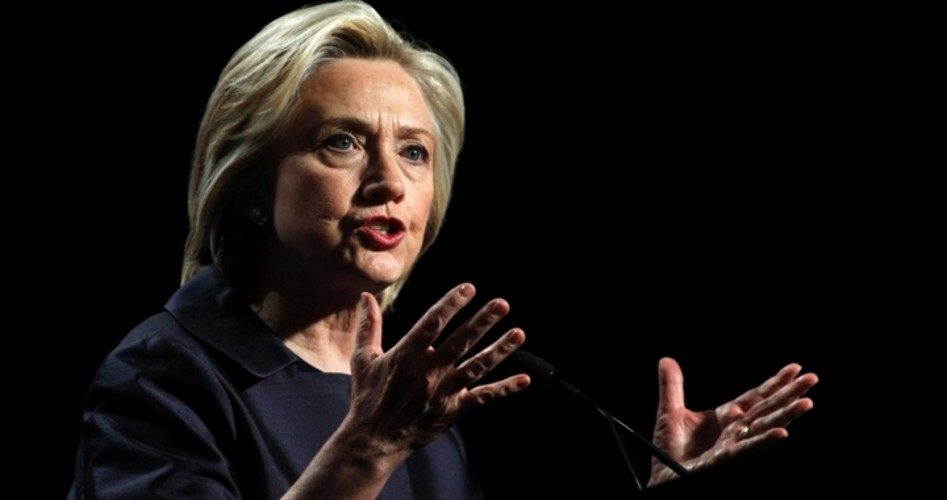
Hillary Clinton has an idea of how to make sure everyone who doesn’t have the time or motivation to register to vote, will get to vote (for her) anyway.
Insisting that automatic voter registration is a “voting rights” issue, the Democratic candidate for president believes this position will resonate with her base.
She may be right.
According to the results of a newly released Public Policy Polling (PPP) survey, 48 percent of respondents approved of automatic voter registration.
During a campaign speech June 4 at Texas Southern University in Houston, Clinton blasted Republicans, accusing the GOP of “systematically and deliberately trying to stop millions of American citizens from voting.”
An article in the Washington Post covering the speech reported that Clinton claimed “Republican state legislatures are intentionally restricting voting by curtailing early access to the polls and other measures in an effort to suppress Democratic turnout.”
Missing from Clinton’s condemnations is any mention of the ACORN voter registration scandal of 2012 that was described in one article as being “like a KGB operation” and “a deliberate, premeditated, comprehensive plan to win the 2012 presidential election at all costs, and is in keeping with the organizational methods, associations and ethics of the Community-Organizer-in-Chief, Barack Obama.”
President Obama recently spoke out in favor of automatic voter registration, as well. In a speech on March 18, he said, “It would be transformative if everybody voted. That would counteract money more than anything. If everybody voted, then it would completely change the political map in this country.”
Although he didn’t go so far as to commit to push for enacting federal mandatory voting legislation, the president did say that such a measure would be a “better strategy in the short term” than reducing the influence of money in the electoral process.
In support of his position, President Obama cited the example of Australia, a country with a mandatory voting law. It is true that Australia has a mandatory voting law, and it is equally true that some may not look at Australia as a particularly poor example of governance; however, the same cannot be said of some of the other countries where voting is compulsory.
Of the 30 (or so) countries with compulsory voting laws on the books, only 11 actively enforce those laws: Argentina, Australia, Brazil, Cyprus, Ecuador, Lichtenstein, Luxembourg, Nauru, Peru, Singapore, and Uruguay.
Until recently, a similar statute was enforced in Libya, as well.
With few exceptions, the countries on the mandatory voting roster do not inspire confidence in the policy.
Admittedly, compulsory voting itself is not a bellwether of good or bad government, but neither is it a panacea for problems of electoral participation. The many eligible voters who do not participate may be one problem, but another problem almost never mentioned is the lack of understanding of many who do vote. Of course, each ballot cast by an uninformed voter is weighed exactly the same as a ballot cast by an informed voter, and requiring all eligible voters to vote would tend to tilt the scales in the direction of uninformed voters.
It’s little wonder that Clinton and Obama are pushing this policy. In a rare admission against interest, the Washington Post said:
Nationwide mandatory voter registration would generally help Democrats, whose support frequently comes from younger and poorer people and minority groups that may also be less likely to sign up to vote at 18 on their own.
Next, the claim made by the president and Clinton that mandatory suffrage will diminish the power of money in politics is not borne out by the facts, either. Writing in the Washington Post, George Mason University School of Law professor and Cato Institute adjunct scholar Ilya Somin points to a significant flaw in the claim:
Most campaign spending represents expenditures on televised ads. For fairly obvious reasons, relatively ignorant voters are more likely to be influenced by simplistic 30 second ads than relatively well-informed ones (who, among other things, tend to have stronger preexisting views). Thus, a more ignorant electorate is likely to be one where campaign spending on television ads exercises more influence.
Somin points out another considerable problem with the president’s idea (one zealously advocated by former members of his administration): It infringes on individual liberty. Somin writes:
In addition to its potentially harmful consequences, mandatory voting is also an unjust infringement on individual liberty. Some people choose not to vote because they find the available options so distasteful that they don’t want to be in the position of supporting any of them. Even if the ballot includes some sort of “none of the above” option, choosing to vote might still be viewed as at least a partial endorsement of the status quo political system, and some citizens might prefer not to signal any such endorsement.
He adds:
Others can reasonably choose to abstain from voting because they lack the knowledge to make a well-informed choice and (quite rightly) don’t want to harm the rest of society by making ignorant decisions. Given the vast size and complexity of modern government, even intelligent and conscientious people will sometimes find themselves in that position. Finally, many people might prefer not to vote simply because they have better uses for their time, including in some cases uses that create more benefit for society, as well as themselves.
Of course, President Obama, Hillary Clinton, most members of Congress, and the courts have shown they have no qualms about invading the territory of individual liberty.
For them, the question is, How can we get to the polls those who have no interest in voting, but if they did vote, would vote to expand the size and power of the government?
Not surprisingly, the groups enumerated by Clinton as victims of voter discrimination historically vote for candidates who promise to lengthen the list of those eligible for government “entitlements.”
The citizens of ancient Rome, for example, were all too willing to cede to emperors their right to self-government so long as the bags of free grain kept coming and there were free tickets to the festivals, games, and other entertainments.
While the positions of Obama and Clinton are well known, the words of the Founders on this subject are more enlightening.
Writing in The Federalist, James Madison said of voting, “The definition of the right of suffrage is very justly regarded as a fundamental article of republican government.”
Later in that same collection, he wrote:
The aim of every political constitution is, or ought to be, first to obtain for rulers men who possess most wisdom to discern, and most virtue to pursue, the common good of society, and in the next place, to take the most effectual precautions for keeping them virtuous whilst they continue to hold their public trust.
In a coda to his “Notes on the Convention” appended sometime between 1821 and 1829, Madison, in an effort to clarify his position on suffrage, was more direct in his assessment:
The right of suffrage is a fundamental article in republican constitutions. The regulation of it is, at the same time, a task of peculiar delicacy. Allow the right exclusively to property, and the rights of persons may be oppressed. The feudal polity alone sufficiently proves it. Extend it equally to all, and the rights of property or the claims of justice may be overruled by a majority without property, or interested in measures of injustice.
In light of her registration rhetoric, it may be that these “measures of injustice” are precisely what Hillary Clinton is seeking in her advocacy of automatic voter registration.
Finally, the very idea that the federal government should have power over the voter rolls is anathema to the Constitution. Article I, Section 4 clearly mandates that, “The times, places, and manner of holding elections for senators and representatives, shall be prescribed in each state by the legislature thereof.”
When it comes to compulsory voting, it seems, the federal government is trespassing on territory meant to be ruled over by the states.
Photo of Hillary Clinton: AP Images



